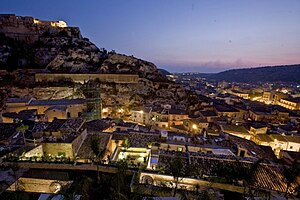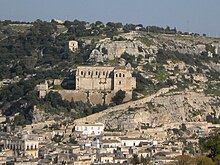Scicli (pronounced like sheekly) is a small town among the Iblei hills in the Ragusa province on the southeast of Sicily. It is one of the "Late Baroque Towns of the Val di Noto" listed on the UNESCO World Heritage List.
Understand
edit
The town sits in a valley at the confluence of the Fiume Irmino and three other rivers (which, however, dry out in the summer). The town is within 10 km from the small sea-side villages of Plaja Grande, Donnalucata, Cava D'Aliga and Sampieri. Scicli was heavily damaged by an earthquake in 1693 and was rebuilt in the style of the Sicilian Baroque, leading to many of its architectural attractions.
Tourist information
edit- Servizio Cultura e Turismo, Via Francesco Mormina Penna (Palazzo Spadaro 1st floor), ☏ +39 0932 839611, turismo@comune.scicli.rg.it. M-F 09:00-13:00.
Get in
editBy plane
editThe Catania airport is the nearest international airport, and AST buses can be taken to reach most destinations.
The Comiso Airport has been modernized and converted for civilian use. It is provided as an alternate airport in the event the Catania airport has to cease operations because of volcanic activity.
By train
edit- 1 Scicli Station. Scicli is on the Siracusa-Ragusa line, connections to Syracuse, Canicatti, Scigli, Modica, and Gela.
By bus
editBus connections are served by the Azienda Siciliana Trasporti (AST) in the south of the province of Ragusa, and especially towards Modica.
By car
editFrom the A18 Messina - Syracuse (which ends at Rosolini), Scicli can be reached via SS115 which makes a sharp turn into Ispica and heads toward Modica.
From the SS115, getting to Scicli is best achieved by taking the SP42. If coming directly from the city center of Modica, the SP54 can be used. A star-shaped network of provincial roads connect Scicli with the environment; you can take the SP40 from Sampieri and SP39 from Donnalucata on the coast.
Get around
editSee
edit




Churches
edit- 1 Chiesa di San Giovanni Evangelista (Church of Saint John the Evangelist). This church stood next to a Benedictine Monastery, whose place in the early 20th century was taken by the Palazzo Municipale. The church was built sometime between 1760 and 1765. It has a concave-convex baroque façade with three levels and a large, oval dome with stained glass windows. The interior walls and ceiling are covered in paintings and stucco reliefs.
- 2 Chiesa di San Matteo, Via S. Matteo, 9.
- 3 Chiesa rupestre del Rosario (Chiesa della Madonna di Monserrato). This "cave" church was built around 1516 on the hill Monte Campagna that overlooks the city. A statue of the Madonna is here and has numerous healings attributed to it.
- 4 Chiesa S. Maria la Nova, ☏ +39 331 400 0858. Bell tower visits by an appointment.
- 5 Chiesa di Santa Maria della Consolazione.
- 6 Chiesa Santa Teresa. An interesting former church with a rectangular façade (17th-18th centuries).
- 7 Complesso della Croce (ex Convento della Croce). An austere late Gothic convent which survived the earthquake of 1693. Now it belongs to the state.
Palazzi
edit- 8 Palazzo Beneventano. This is an excellent example of the Baroque style in Scicli. This palace features interesting gargoyles on the balcony lintels.
- 9 Palazzo Spadaro, via F.M.Penna, 34. Summer: 10:00-24:00. Built in 17th-18th centuries. The Pinacoteca comunale, which occupies the building, has a collection consists of works by artists of the Gruppo di Scicli.
- 10 Palazzo Fava. One of the first and largest Baroque palaces in the town. Its 18th-century façade is richly decorated.
- 11 Palazzo Veneziano-Sgarlata.
- 12 Palazzo Bonelli (Patanè), via F.M.Penna. Summer: 10:30-12:30 17:30-21:30 (Su until 22:30); winter: 16:30-23:30.
- 13 Palazzo Palle (Palazzo Municipio). Built at the beginning of the 20th century.
Other sites
edit- 14 Chiafura. This is an ancient neighborhood, now an archaeological park, that was carved into the rock. In ancient times the area was used as a cemetery. It was gradually transformed into a settlement in the early medieval period, coinciding with the Arab conquest, and was occupied without interruption until the middle of the tenth century.
- 15 [dead link] Grotte Museo "A rutta ri Ron Carmelu" (Cave Museum). by appointment M-F 09:00-13:00, 17:00-19:00 (summer until 20:30); Sa Su 09:30-13:00, 16:00-19:00. A museum in a cave dwelling.
- 16 Villa Penna. A former private garden of the Barons of Penna. It's now a well kept villa comunale worth for a break in a hot day. At the topmost terraces on the west there is a Capuchin monastery.
Do
edit- The Festa delle Milizie. This event commemorates the dispute between the Saracens and Christians (the Normans) in 1091. It takes place in the last week of May and celebrates the intervention of the Madonna delle Milizie (Virgin Mary, literally translated as the Madonna of the Militia) on behalf of the Christians. The events are replayed as an open air game and the week finishes with religious services.
Buy
editEat
edit- 1 Pasticceria Basile, viale I Maggio n. 3, ☏ +39 333 678 5876. This bakery has been in business since 1966. They offer an assortment of pastries in addition to chocolates, candy, and local honey.
Drink
editSleep
edit- 1 Novacento, Via Duprè, 11. This palace has been converted into a hotel. The interior is clean and bright. This hotel has free breakfast, a restaurant, and a café with outdoor seating. Car parking is offered and bike rentals are available.

